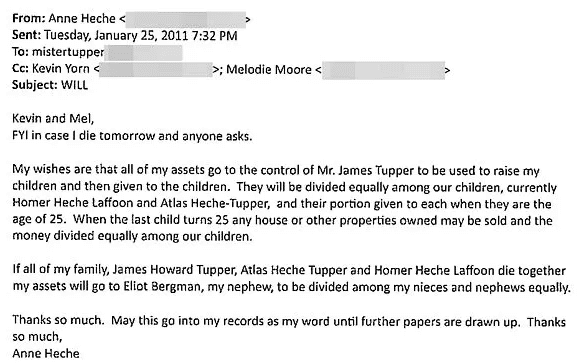Can an emailed will be a will? That’s the question at the center of a dispute between actress Anne Heche’s son and her former significant other.
Heche died in August at age 53. Shortly after, her 20-year-old son, Homer Laffoon, petitioned a California court to be named executor to administer her estate and for the court to determine that she died with no will, or “intestate.”
Emailed Will Introduces Complications
Her former partner James Tupper has objected to the appointment based on an email he received 11 years ago.
The email appears to be from Heche, and subject line reads “WILL.” It goes on to say that she wishes for Tupper to manage her estate and her money for the benefit of her two sons, at that time age 11 and 3. It ends “may this go into my records as my word until further papers are drawn up. Thanks so much, Anne Heche”
Homer’s response argues (and observers agree) that the email cannot be valid because it does not satisfy the formalities required. For a formal will in California (and most other states, including Arizona) to be valid, it must have signatures of the testator and two witnesses. Heche’s will clearly does not qualify because there are no witnesses.
Also Not ‘Holographic’ or ‘Digital’
California (like Arizona) also recognizes wills written in the handwriting of the testator – known as holographic wills. All material provisions need to be in the person’s own writing and there must be a signature. Because Heche’s emailed will is typed, it cannot qualify as a holographic exception to the will formalities.
The emailed will also can’t qualify as a “digital will.” Several states (like Arizona, but not California) have adopted procedures for the execution of wills digitally. But there are lots of requirements, including witnesses and tamper-resistant storage, that so far have made them too procedurally cumbersome to be common. Simply being in a digital format does not qualify.
There Still May Be Hope for Tupper
But that doesn’t necessarily mean Mr. Tupper is out of luck.
What Homer and and observers overlook is that California (unlike Arizona) has what’s known as the “harmless error rule.” In certain circumstances, a testator’s mistakes in executing a will can be forgiven. California’s statute says:
(2) If a will was not executed in compliance with paragraph (1) [signed by two witnesses], the will shall be treated as if it was executed in compliance with that paragraph if the proponent of the will establishes by clear and convincing evidence that, at the time the testator signed the will, the testator intended the will to constitute the testator’s will.
The will is not ambiguous; the writing clearly purports to be a will, and the writer appears to believe the emailed will can stand. But is the document signed? Homer argues that the signature does not qualify. The California courts might not agree.
Seems Far-Fetched, But May Not Be
It may seem far-fetched to those of us in Arizona, where courts seriously respect will formalities. But in other parts of the world, writings with even less will-like attributes can be valid. Consider Australia, where the harmless error rule has been in place since the 1970s.
For instance, there’s the case of Mark Nichol, who took his own life in October of 2016. When a friend of his widow opened his cell phone to look for contacts, she found a text message apparently typed out by Mr. Nichol just before his death. He never sent the message, but he did refer to it as “My will” and included language disinheriting his wife and son. A Queensland, Australia, judge decided that Mr. Nichols’ unsent text message was admissible as his last will.
Another Queensland case has similar facts. Karter Yu created a number of documents on his iPhone just before committing suicide in 2011. One of them began with “This is the last Will and Testament of Karter Yu.” The court ruled that it was.
Could California Follow Australia?
Could California follow Australia’s lead? The California statute requires a signing. Is a typed out name a signing? Should it matter? If the court can determine a decedent’s wishes with some certainty, are there any good reasons not to follow them?
A common concern is that the number of litigated cases will skyrocket and overwhelm the courts. Research suggests that should not be a concern.
Now that so much of our lives exists in the digital space, maybe an emailed will like Anne Heche’s should get some respect.




4 Responses